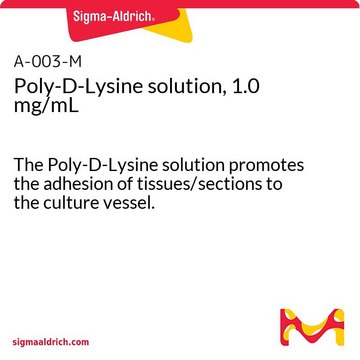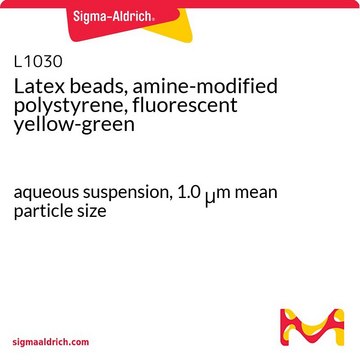推薦產品
product name
聚-D-赖氨酸 氢溴酸盐, mol wt 70,000-150,000, lyophilized powder, γ-irradiated, BioReagent, suitable for cell culture
生物源
synthetic (organic)
品質等級
無菌
γ-irradiated
產品線
BioReagent
BioXtra
形狀
lyophilized powder
分子量
70,000-150,000
包裝
pkg of 10 X 5 mg
pkg of 5 mg
濃度
0.016—0.032 mmol lysine
技術
cell culture | mammalian: suitable
表面覆盖率
4 μg/cm2
雜質
<10% water (by Karl Fischer)
溶解度
H2O: soluble 50 mg/mL, clear, colorless
運輸包裝
ambient
儲存溫度
−20°C
SMILES 字串
O=C(C)[C@@](NC)([H])CCCCN.[Br]
InChI
1S/C6H14N2O2.BrH/c7-4-2-1-3-5(8)6(9)10;/h5H,1-4,7-8H2,(H,9,10);1H
InChI 密鑰
MEXAGTSTSPYCEP-UHFFFAOYSA-N
尋找類似的產品? 前往 產品比較指南
相關類別
應用
- 作为培养板的涂层用于培养大鼠神经胶质前体细胞(RGPCS)。
- 用于包被继代培养伸长细胞的培养瓶和培养板
- 处理盖玻片的表面以便细胞附着
建议使用0.5 - 1.0 mL的该产品0.1 mg/mL溶液用作细胞培养的基质对25 cm2进行涂覆。 较低分子量的该产品粘度相对较低,但较高分子量的形式则可提供每分子更多的附着位点。
生化/生理作用
特點和優勢
- 用伽马(γ)射线消毒
- 在2-8˚C下无菌多聚-D-赖氨酸溶液可保存三年。
成分
注意
準備報告
同類產品
儲存類別代碼
11 - Combustible Solids
水污染物質分類(WGK)
WGK 3
閃點(°F)
Not applicable
閃點(°C)
Not applicable
個人防護裝備
Eyeshields, Gloves, type N95 (US)
分析證明 (COA)
輸入產品批次/批號來搜索 分析證明 (COA)。在產品’s標籤上找到批次和批號,寫有 ‘Lot’或‘Batch’.。
客戶也查看了
文章
Cancer stem cell media, spheroid plates and cancer stem cell markers to culture and characterize CSC populations.
Cancer stem cell media, spheroid plates and cancer stem cell markers to culture and characterize CSC populations.
Extracellular matrix proteins such as laminin, collagen, and fibronectin can be used as cell attachment substrates in cell culture.
Extracellular matrix proteins such as laminin, collagen, and fibronectin can be used as cell attachment substrates in cell culture.
我們的科學家團隊在所有研究領域都有豐富的經驗,包括生命科學、材料科學、化學合成、色譜、分析等.
聯絡技術服務








